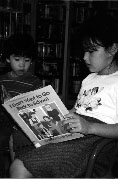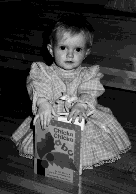

A research study conducted in 1994/95 in the United
Kingdom has drawn some interesting and thought-provoking
conclusions in the area of family literacy. The study
included four programs based in areas of multiple
deprivation in the United Kingdom (Cardiff, Liverpool,
Norfolk and North Tyneside). Each program comprised 96 hours
over 12 weeks. Participants were children aged 3 to 6 years
and their parents (predominantly mothers). The aims of the
programs were to boost children's literacy, parents'
literacy and parents' ability to help their children in
school. On entry, parents had low levels of literacy and many of
their children had low development in vocabulary and
emergent reading and writing. Parents worked on their own
literacy, built on home literacy activities and learned how
to extend the help they gave their children. Children were
given intensive early years teaching, with a strong emphasis
on writing and speaking, as well as reading. Parents worked
with their children in joint sessions and used the
strategies they had been taught for helping them. Some Key
Findings Benefits to the
children: Benefits to the
Parents: Bonus Effects: Follow-up Study
A follow-up study, conducted in 1997, concluded that the
Family Literacy children maintained the gains they made and
their parents continued to widen their participation in
education and society. Sources: Family Literacy Works, The NFER Evaluation of the
Basic Skills Agency's Demonstration Programmes. Greg
Brooks, Tom Gorman, John Harman, Dougal Hutchison and Anne
Wilkin. The Basic Skills Agency, London, 1996. Family Literacy Lasts: The NFER follow-up study of the
Basic Skills Agency's Demonstration Programmes, Greg
Brooks, Tom Gorman, John Harmon, Dougal Hutchison, Kay
Kinder, Helen Moor, Anne Wilkin, The Basic Skills Agency,
London, 1997.


For more information about the Centre for Family Literacy Project, contact the project coordinator at the address below, or contact Prospects Literacy Association.
Centre for Family Literacy
Project
9913-108 Ave, EDMONTON, Alberta,
T5H
1A5 CANADA
Phone: 780-424-1660 Fax:
780-424-1676
cflp@aaal.ab.ca
PRINTABLE VERSION of this page
|
©1998-2000, OM Corporation |